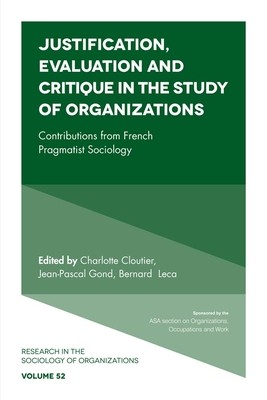
- We will send in 10–14 business days.
- Publisher: Emerald Publishing Limited
- ISBN-10: 1787143805
- ISBN-13: 9781787143807
- Format: 15.5 x 23.1 x 2.5 cm, kieti viršeliai
- Language: English
- SAVE -10% with code: EXTRA
Justification, Evaluation and Critique in the Study of Organizations (e-book) (used book) | bookbook.eu
Reviews
Description
The papers included in the volume explore how mobilizing Boltanski and Thévenot's EW framework helps address questions regarding the premises and dynamics of agreement and disagreement in coordinated action, both within and across organizations, and by so doing, help advance our understanding of organizational processes more generally. The book is organized into four sections, each with contributions that address one of the four core theoretical objectives around which the volume is structured (1) to clarify how individuals manage the contradictions and compromises inherent to organizational pluralism; (2) to look at organizations critically by unpacking the roles of rhetoric and justification in the practice of critique; (3) to reconsider valuation and evaluation in organizations; and (4) to push the boundaries of the EW framework. These four objectives provide a scaffolding that helps further embed the framework in our contemporary thinking about organizations.
EXTRA 10 % discount with code: EXTRA
The promotion ends in 22d.02:49:24
The discount code is valid when purchasing from 10 €. Discounts do not stack.
- Publisher: Emerald Publishing Limited
- ISBN-10: 1787143805
- ISBN-13: 9781787143807
- Format: 15.5 x 23.1 x 2.5 cm, kieti viršeliai
- Language: English English
The papers included in the volume explore how mobilizing Boltanski and Thévenot's EW framework helps address questions regarding the premises and dynamics of agreement and disagreement in coordinated action, both within and across organizations, and by so doing, help advance our understanding of organizational processes more generally. The book is organized into four sections, each with contributions that address one of the four core theoretical objectives around which the volume is structured (1) to clarify how individuals manage the contradictions and compromises inherent to organizational pluralism; (2) to look at organizations critically by unpacking the roles of rhetoric and justification in the practice of critique; (3) to reconsider valuation and evaluation in organizations; and (4) to push the boundaries of the EW framework. These four objectives provide a scaffolding that helps further embed the framework in our contemporary thinking about organizations.


Reviews